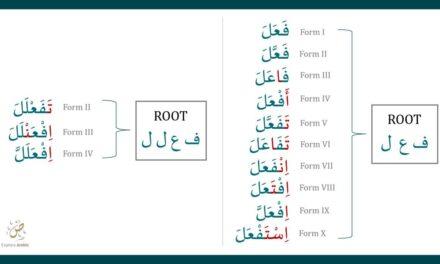One of the daunting aspects of learning Arabic (in Arabic) can be getting your head around the terms used to analyse language such as ‘noun’, ‘pronoun’, ‘adverb’, ‘relative clauses’ etc. This is called ‘meta-language’. Those who have studied a second language or linguistics will be aware of these terms.
However, those who have not, may still find knowing the English terminology helpful in order to better understand the terminology in a context they’re familiar with e.g. if you’re not sure what an adverb is, you can look it up and compare sentences with adverbs in your own language with those in Arabic.
It’s important to keep in mind however, there are some aspects of Arabic grammar non-existent in English so some phrases may only be understood by linguists.
| Arabic Term | English Equivalent | Notes |
|---|---|---|
| اِسْمٌ – اسْمَاء | noun | Although this means ‘noun’, in Arabic it refers to anything that isn’t a verb or a particle (particles are like و ، هَلْ، مَنْ etc) so it can even include a |
| عَلَمٌ | proper noun/name | أحْمَد، الصِين، الدِمَشق … |
| فِعْلٌ – أفْعَالٌ | verb | ذَهَبَ (يَذْهَبُ)، اِفْتَقَدَ (يَفْتَقِدُ) … |
| حَرْفٌ – حُرُوف/أحْرُف | particle | مَنْ، هَلْ، مِنْ، عَنْ … |
| مُفْرَدٌ | singular | بَيْتٌ ، بِنتٌ ، بَقَرَةٌ ، رَجُلٌ … |
| جَمْعٌ | plural | بُيُوتٌ، بَنَاتٌ ، بَقَرٌ، رِجَالٌ … |
| مَاضٍ (المَاضِي) | past | ذَهَبَ، افْتَقَدَ، اسْتَشْفَى… |
| مُضَارِعٌ | present | يَذْهَبُ، يَفْتَقِدُ ، يَسْتَشْفِي… |
| ضَمِيْرٌ – ضَمَائِرٌ | pronoun | هُو، هِيَ، أنْتَ، أنْتُمْ … |
| حَرْفُ جَّرٍّ | prepostion | مِنْ ، إلىٰ ، عَلىٰ … |
| فَتْحَةٌ | ‘a’ vowel | ـَ |
| كَسْرَةٌ | ‘i’ vowel | ـِ |
| ضَمَّةٌ | ‘u’ vowel | ـُ |
| سُكُونٌ | the tashkeel for a consonant | ـْ |
| مُتَحَرِّكٌ | vowelised | |
| شَدَّةٌ | double letter | ـّ |
| إضَافَةٌ | possessive construction | This is a common grammatical structure in Arabic where two words are put together. In The first is made indefinite (in structure) and the second is made genitive (i.e. it ends in kasrah or an article representing kasrah) بَيْتُ الرَجُلِ The house of the man |
| جُمْلَةٌ | sentence | A sentence in Arabic is a group of words put together that make sense. |
| كَلِمَةٌ – كَلِمَات | word | All words in Arabic fall into one of the 3 categories: noun, verb or particle |
| كَلام | speech, language, conversation | |
| مُذَكَّرٌ | male | Arabic words are gender sensitive – whether nouns or verbs. |
| مُؤَنَّثٌ | female | Arabic words are gender sensitive – whether nouns or verbs. |
| مَجْزُومٌ | consonant jussive (adj) |
When a verb is made to end in sukoon ـْ or what represents it E.g. يَذْهَبْ ، يدْرُسْ |
| الجَزْمُ | jussive (n) | |
| فَاعِلٌ | subject (‘doer’) | ذَهَبَ مُحَمَّدُ إلىٰ المَدْرَسَةِ Muhammad went to school. The one who did the action/ the doer of the verb |
| نَائِبُ الفَاعِل | passive subject (‘subject representative) |
The object which becomes the subject in the passive voice. فُتِحَ البَابُ |
| مُبْتَدَأ | subject (of a nominal sentence) |
مُحَمَّدُ ذَكِيٌّ Arabic sentences don’t have to have a verb to be a sentence. They can be composed of only nouns – we call this a nominal sentence. |
| خَبَرٌ | predicate | مُحَمَّدُ ذَكِيٌّ Muhammad is intelligent. Arabic sentences don’t have to have a verb to be a sentence. They can be composed of only nouns. |
| النَّعْتُ | adjective | |
| صِفَةٌ | adjective | This type of adjective refers to the type that changes |
| التَّوْكِيْدُ | emphasis | جاءَ الْأمِيْرُ نَفْسُهُThe prince, himself, came |
| العَطْفُ | conjunction | و ، فـ ، ثُمَّ ، أَو |
| المَفعُول | Subject of a verb in the passive voice | كَتَبَ (to write) ➡ كَاتِبٌ (writer) ➡ مَكْتُوبٌ (written) |
| البَدْلُ | substitute | شَرَحَ المُعَلِّمُ مَحْمُودٌ The teacher, Mahmoud, explained. |
| مَبْنيِ لِلْمَجْهُول | passive voice | فَتَحَ الوَلَدُ البَابَ |
| مَبْنيِ لِلْمَعْلُوم | active voice | فُتِحَ البَابُ |
| المَصْدَرُ | verbal noun | درَسَ (to study) ➡ دِرَاسَة (studying) |
| المَفْعُوْل بِه | object (of a verbal clause) | فَتَحَ الوَلَدُ البَابَ |
| الحَال | conditional | قَطَعْتُ الطَريِقَ رَاكِضَا |
| ظَرْفُ الْمَكانِ | adverb of place | فَوْقَ، تَحتَ، يَسَار |
| ظَرْفُ الزَّمانِ | adverb of time | ذهَبْتُ إلى المدْرَسَة صَبَاحًَا |
| الْمُنَادَى | vocative | يا مُحَمَّدُ |
| التَمْيِيْز | specification | لَدَي خَمسَةَ رِيَالاتٍ |
| الاِسْتِثْناء | exception | غَيْر ، سِوى ، إلَّا |
| مَرْفُوعٌ | nominative (adj) | Words which end in ـُ/ـٌ (or a representative) |
| الرَفْعُ | nominative (n) | |
| مَنْصوب | accusative (adj)subjunctive | Words which end in ـَ /ـً (or a representative) |
| النَصْب | accusative (n) subjunctive |
Accusative is to do with nouns, and the subjunctive is to do with verbs |
| مَجْرُورٌ | genitive (adj) | Words which end in ـِ /ـٍ (or a representative) |
| الجَرّ | genitive (n) | |
| اِعْرَابٌ | parsing | Identifying the role of a word in a sentence |
| جُمْلَة اسْمِيَّة | Nominative sentence | A sentence which starts with a noun. محمدُ طالِبٌ. Muhammad is a student |
| جُمْلَة فِعْلِيّة | Verbal sentence | A sentence which starts with a verb. دَرَس محَمَّدُ اللُغَة العَرَبِيّة Muhammad studied Arabic. |
Here’s a table which can help you understand terminology.
NOTE: Not understanding these words will NOT prevent you from learning or understanding Arabic grammar. If you’re learning Arabic, your teacher will go through this gradually, and knowing what it is in Arabic is definitely enough.
Keen to memorise these grammar terms? Click the following link to our flashcards set on Quizlet – so you can learn the words and test yourself.
Any words not included in the list above? Comment below!


![Theme: War and Conflict [A2 Vocabulary]](https://www.explorearabic.org/wp-content/uploads/2023/05/WP-Learning-lab-images-440x264.png)





